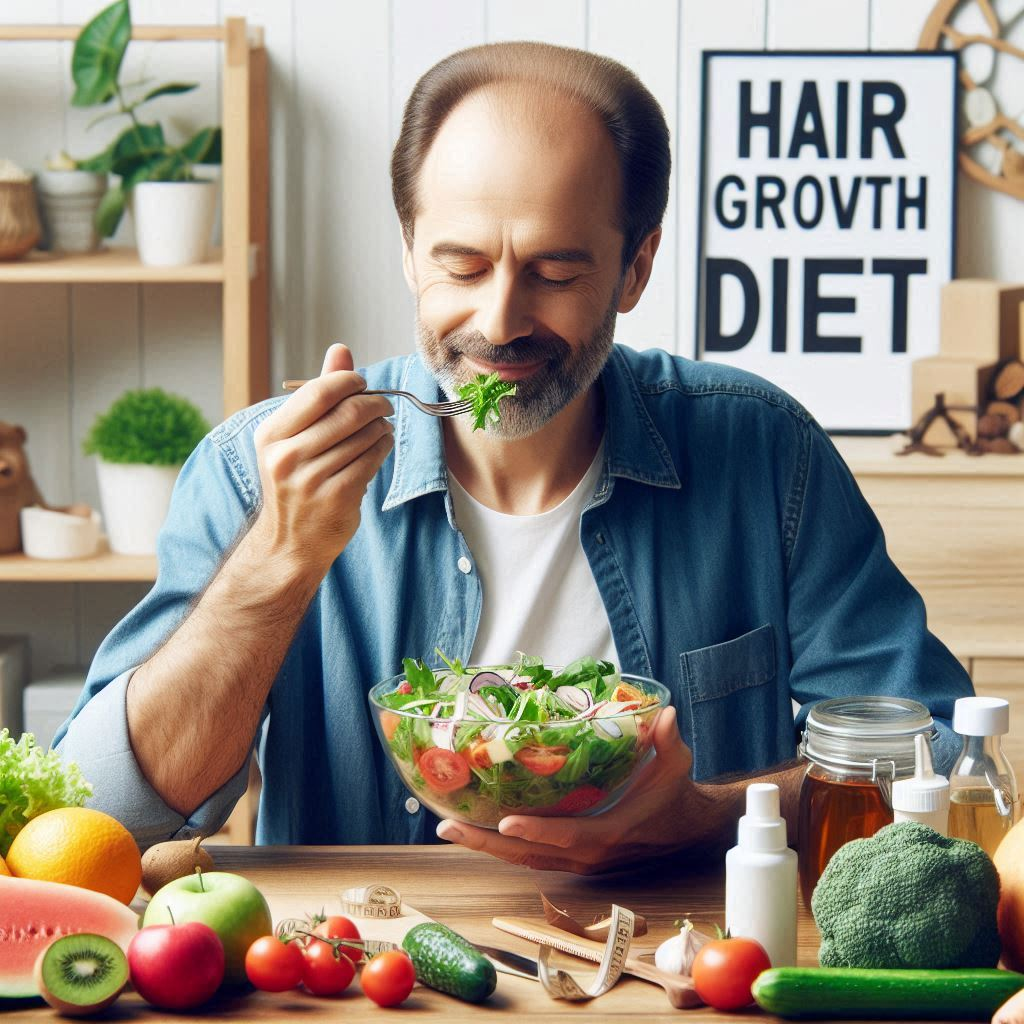
Hair Loss, Biotin, Nutrient, Healthy Diet
Hair loss can be influenced by a variety of factors including genetics, hormonal imbalances, stress, and nutrition. Biotin, also known as vitamin B7, is often touted as beneficial for hair health.

Biotin
- Role: Biotin plays a role in the health of hair, skin, and nails. It helps convert nutrients into energy and is important for the growth and maintenance of healthy hair.
- Sources: You can get biotin from foods like eggs, nuts, seeds, and certain vegetables. It’s also available as a dietary supplement.
- Effectiveness: Biotin deficiency can lead to hair loss, but most people get enough biotin from their diet. Supplementing with biotin is usually only necessary if you have a deficiency.
Biotin-Rich Foods
- Eggs: Particularly the yolks, which are high in biotin.
- Nuts and Seeds: Almonds, walnuts, and sunflower seeds are great sources.
- Legumes: Lentils, chickpeas, and peanuts offer biotin.
- Whole Grains: Foods like oats and barley contain biotin.
- Leafy Greens: Spinach and kale provide biotin.
- Fish: Salmon and other fatty fish offer biotin and are also good sources of omega-3 fatty acids.
- Sweet Potatoes: They contain biotin as well as other beneficial nutrients.
- Avocados: These are not only high in biotin but also healthy fats.
- Berries: Raspberries, strawberries, and other berries offer biotin along with antioxidants

Other Nutrients
- Protein: Hair is made of keratin, a type of protein. Ensuring you get enough protein in your diet can support hair strength and growth.
- Iron: Iron deficiency is a common cause of hair loss, especially in women. Iron-rich foods like red meat, spinach, and lentils can help.
- Vitamin D: Low levels of vitamin D have been linked to hair loss. Sun exposure and foods like fatty fish and fortified dairy products can help boost vitamin D levels.
- Omega-3 Fatty Acids: These essential fats help keep your scalp healthy. Sources include fish like salmon, flaxseeds, and walnuts.
- Zinc: Zinc plays a role in hair tissue growth and repair. Foods like beef, pumpkin seeds, and lentils are good sources.
Healthy Diet Tips
- Balanced Macronutrients:
- Proteins: Include lean meats, fish, beans, and legumes.
- Carbohydrates: Opt for whole grains like brown rice, quinoa, and whole wheat bread.
- Fats: Incorporate healthy fats from avocados, nuts, seeds, and olive oil.
- Micronutrients:
- Vitamins and Minerals: Ensure you’re getting a range of vitamins and minerals by eating a colorful variety of fruits and vegetables.
- Iron and Zinc: Include sources like red meat, beans, nuts, and seeds.
- Hydration:
- Drink plenty of water throughout the day to support overall health and keep your scalp hydrated.
- Limit Processed Foods:
- Reduce the intake of processed and sugary foods, which can impact overall health negatively.
- Regular Meals:
- Eat regularly to maintain steady energy levels and support overall metabolic processes.
Dietary Considerations
- Balanced Macronutrients:
- Ensure you’re consuming a balanced intake of proteins, fats, and carbohydrates. Overemphasis on one macronutrient at the expense of others can lead to nutritional imbalances.
- Avoiding Extreme Diets:
- Extreme or overly restrictive diets can lead to nutrient deficiencies, including biotin. Aim for a well-rounded diet rather than fad diets.
- Be Cautious with Supplements:
- If you’re taking biotin supplements, avoid excessive doses as very high levels may not offer additional benefits and could potentially cause imbalances.
- Minimize High-Glycemic Foods:
- Foods that cause rapid spikes in blood sugar can contribute to inflammation. Opt for low to moderate glycemic index foods to support overall health.

Foods and Substances to Limit
- Excessive Alcohol:
- Alcohol can interfere with nutrient absorption and increase the risk of deficiencies, including biotin.
- High-Sugar and Processed Foods:
- These can contribute to inflammation and nutrient imbalances that may affect hair health and overall well-being.
- Raw Egg Whites:
- Raw egg whites contain avidin, a protein that binds biotin and prevents its absorption. Cooking egg whites deactivates avidin, so it’s generally safe to eat cooked eggs.
- Highly Processed Foods:
- Foods high in additives, preservatives, and unhealthy fats may detract from overall nutrient quality.
- Caffeine in Excess:
- While moderate caffeine intake is generally fine, excessive caffeine can impact nutrient absorption and hydration levels.










